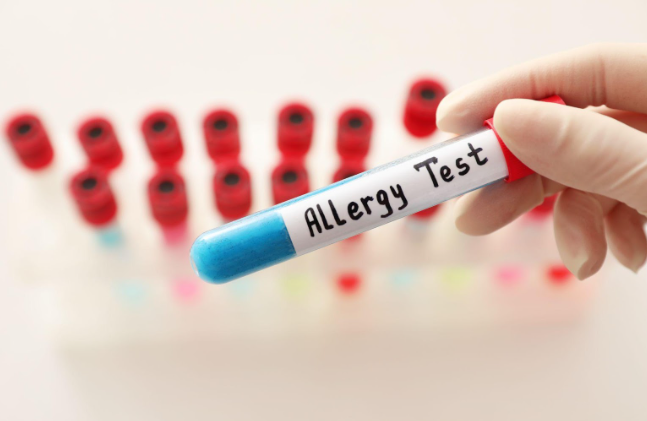Understanding Allergy Testing and Treatment Options Available In-Office
Understanding Allergy Testing and Treatment Options Available In-Office

When allergies interrupt your day-to-day life with sneezing, congestion, rashes, or breathing issues, the first step toward long-term relief is identifying the root cause. In-office allergy testing offers accurate, safe, and comprehensive diagnostic options that go beyond what at-home kits or guesswork can provide.
Whether you're managing seasonal sensitivities or unexplained symptoms, understanding your triggers through professional evaluation allows you to make informed choices about your treatment.
Why In-Office Allergy Testing?
In-office allergy testing gives you access to qualified providers who review your full medical history, medications, and exposure habits to determine the right test and interpret the results within that clinical context. You also benefit from immediate medical supervision during testing. If there’s a reaction, trained staff are available to intervene and manage it appropriately.
This level of oversight is especially important if you’ve experienced severe allergies in the past or are unsure about the nature of your symptoms.
Types of In-Office Allergy Tests and How They Work
Some triggers, like dust mites, mold spores, and pet dander, can affect you all year long. Others, such as ragweed or grass pollen, are seasonal and may only flare up during certain months. Your doctor will help you determine which method is appropriate based on your age, symptoms, and medical conditions.
Common in-office allergy tests include:
Intradermal Testing
This test is for when skin prick results aren’t clear, but you still have allergy symptoms. A tiny amount of allergen is injected just under your skin to find hidden allergies, like to insect stings or some medicines. It’s done carefully because it can cause a stronger reaction.
Specific IgE Blood Testing
This blood test checks for allergy antibodies in your blood. It’s helpful if you have skin problems, asthma, or can’t stop allergy medicines before testing. One blood draw can test many allergens. Results take a few days and help your doctor understand your allergies better.
What to Expect During Your Allergy Testing Appointment
Your allergy testing appointment typically starts with a detailed medical history review. You’ll be asked about your symptoms, lifestyle, and any previous allergic reactions. Based on that, your healthcare provider will decide which tests are most appropriate.
The actual testing process is usually quick and involves minimal discomfort. Most reactions are visible within minutes, and your provider will explain what each result means for your treatment options.
In-Office Treatments That Offer Better Relief
Many allergy symptoms can be effectively managed with prescription medications, but in-office treatments provide longer-lasting relief, especially for chronic or severe allergies. Your healthcare provider will tailor a treatment plan based on your specific allergy type and severity.
Allergy Immunotherapy
These injections are given regularly in the clinic to help your immune system build tolerance to specific allergens over months to years. This approach can significantly reduce symptoms and may even prevent new allergies or asthma from developing.
Sublingual Immunotherapy (SLIT)
This involves placing allergen tablets or liquid drops under your tongue. After the initial dose and monitoring in the office, you can safely continue treatment at home. It is a convenient, needle-free alternative that has gained popularity due to its ease and effectiveness.
Prescription Medications
Your doctor can prescribe nasal corticosteroids, oral antihistamines, leukotriene receptor antagonists, or combination therapies tailored to your symptoms. These medications help control inflammation and provide fast relief during allergy seasons or unexpected flare-ups. Treatment plans are regularly reviewed to ensure optimal symptom management with minimal side effects.
How You Can Prepare for Your Allergy Testing Visit
By carefully preparing, you help your healthcare provider deliver an accurate diagnosis and effective treatment tailored to your specific allergies. Here’s what you need to know before your appointment:
Avoid Certain Medications
Medications like antihistamines, some antidepressants, and nasal sprays can affect your test results by suppressing allergic reactions. Your provider will tell you exactly which medications to stop and how many days before testing. Following these guidelines is essential to avoid false negatives and get reliable results.
Disclose All Medications and Supplements
Be sure to share a complete list of all prescription drugs, over-the-counter medicines, vitamins, and herbal supplements you’re taking. Some supplements, such as fish oil or herbal remedies, may affect your immune response during testing. Full transparency helps your provider choose the best testing method and keep you safe.
Wear Comfortable, Loose-Fitting Clothing
Skin allergy tests are usually done on your arms or back. Wearing short sleeves or clothing that easily rolls up will make the process quicker and more comfortable. Avoid tight or restrictive clothing that might interfere with access.
Prepare a Clear Record of Symptoms and Triggers
Keep a detailed list of your allergy symptoms, when they happen, and any possible triggers like foods, pets, or environments. This helps your provider select the right allergens to test and interpret your results accurately for a personalized treatment plan.
Bring Emergency Medications if You Have Severe Allergies
If you have a history of serious allergic reactions, bring your emergency medications, such as an epinephrine auto-injector (EpiPen) or antihistamines. This makes sure your safety during testing, and your healthcare team will be prepared to respond if needed.
Looking for the best in-office allergy testing and personalized treatment to finally get your symptoms under control?
Schedule your allergy consultation with our
Sisselman Medical Group specialists to start a focused, expert-guided approach to managing your allergies.











